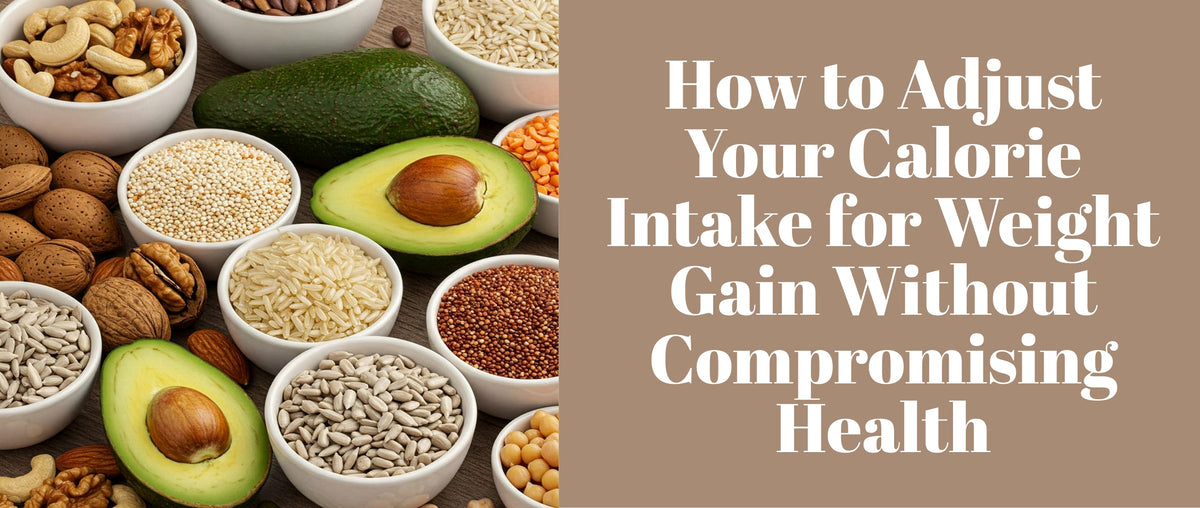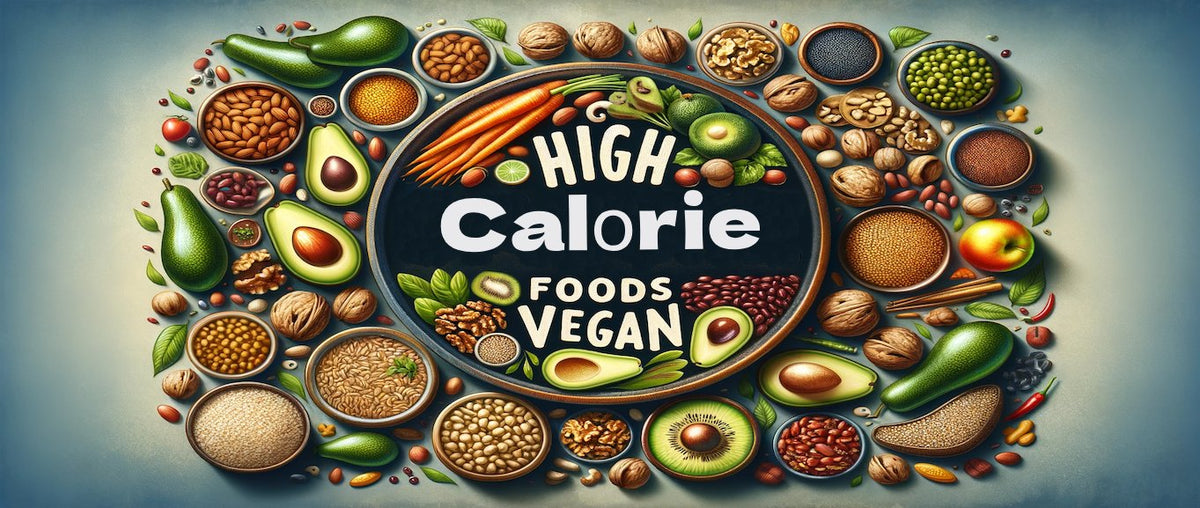How to Adjust Your Calorie Intake for Weight Gain Without Compromising Health
Gaining weight can be just as challenging as losing it. Whether you're looking to build muscle, recover from an illness, or maintain a balanced healthy diet, increasing calorie intake should be done thoughtfully. Simply eating more junk food or unhealthy fats can lead to negative health consequences such as excessive fat gain, cholesterol issues, and digestive problems.
Instead, focusing on cholesterol free foods, nutrient-dense meals, and a heart healthy diet will help ensure you gain weight in a sustainable and healthy manner.
Key Takeaways
- Gradual calorie increase is key – A surplus of 300–500 calories per day is ideal for slow, steady weight gain.
- Prioritize nutrient-dense foods – Include vegan butter, unsalted butter, and cashew butter for healthy fats, along with high protein snacks and plant based protein to build muscle.
- Exercise plays a role – Resistance training helps convert excess calories into muscle rather than fat.
- Monitor progress – Tracking weight gain ensures adjustments can be made without excessive fat accumulation.
Assessing Your Current Caloric Needs
Before increasing your caloric intake, it’s important to understand your Basal Metabolic Rate (BMR) and Total Daily Energy Expenditure (TDEE). These two factors determine how many calories your body requires daily.
Calculating Basal Metabolic Rate (BMR)
Your BMR is the number of calories your body burns at rest to maintain basic functions like breathing and digestion.
Here’s a simple formula to estimate your BMR using the Mifflin-St Jeor Equation:
| Gender | Formula |
|---|---|
| Men | BMR = (10 × weight in kg) + (6.25 × height in cm) – (5 × age) + 5 |
| Women | BMR = (10 × weight in kg) + (6.25 × height in cm) – (5 × age) – 161 |
For example, a 25-year-old woman weighing 55 kg (121 lbs) and 165 cm (5’5’’) tall would have a BMR of:
(10 × 55) + (6.25 × 165) – (5 × 25) – 161 = 1,321 kcal/day
Understanding Total Daily Energy Expenditure (TDEE)
Your TDEE accounts for the calories you burn through daily activities and exercise. It’s calculated by multiplying your BMR by an activity level factor:
| Activity Level | Multiplier | Example Lifestyle |
|---|---|---|
| Sedentary | 1.2 | Little or no exercise |
| Lightly Active | 1.375 | Light exercise (1–3 days/week) |
| Moderately Active | 1.55 | Moderate exercise (3–5 days/week) |
| Very Active | 1.725 | Intense exercise (6–7 days/week) |
| Super Active | 1.9 | Highly active (athlete, manual labor) |
Using the same 25-year-old woman’s BMR (1,321 kcal/day), if she exercises 3–5 times per week (moderately active), her TDEE would be:
1,321 × 1.55 = 2,047 kcal/day
This means she needs 2,047 kcal/day to maintain her weight.

Strategies to Increase Caloric Intake Safely
Increasing calories doesn’t mean bingeing on unhealthy, processed foods. A healthy diet focuses on nutrient-dense, cholesterol free foods that provide essential vitamins, minerals, and balanced macronutrients.
Gradual Caloric Surplus
A sustainable calorie surplus of 300–500 kcal/day is ideal for healthy weight gain.
| Goal | Caloric Surplus | Expected Weight Gain |
|---|---|---|
| Slow Gain | +250 kcal/day | 0.25 kg (0.5 lbs) per week |
| Moderate Gain | +500 kcal/day | 0.5 kg (1 lb) per week |
| Fast Gain | +750 kcal/day | 0.75 kg (1.5 lbs) per week |
Frequent, Balanced Meals
Instead of eating three large meals, aim for 5–6 smaller meals per day, including nutrient-rich snacks like high protein snacks and Healthy Snacks for Kids.
Example Eating Schedule
| Time | Meal |
|---|---|
| 8 AM | High protein vegan breakfast (Oatmeal + nuts + Oat Milk) |
| 10 AM | Smoothie with plant based protein, banana, and peanut butter |
| 12 PM | Brown rice + tofu + low fat mayonnaise dressing |
| 3 PM | Whole wheat sandwich with vegan cheese and hummus |
| 6 PM | Grilled tempeh + quinoa + garlic butter sautéed veggies |
| 9 PM | Yogurt with chia seeds and cashew butter |
Incorporating Calorie-Dense, Nutrient-Rich Foods
Adding calorie-dense yet healthy foods is a game-changer for weight gain. Focus on:
- Healthy fats: Unsalted butter, nuts, cashew butter, seeds, avocado
- Protein sources: Lentils, tempeh, tofu, High Protein Vegan Food
- Carbohydrates: Whole grains, potatoes, quinoa
- Dairy alternatives: Oat Milk, almond milk, vegan cheese
Importance of Macronutrients in Weight Gain
Macronutrients—proteins, carbohydrates, and fats—play an essential role in healthy weight gain.
Proteins: The Building Block of Muscle
If you’re looking to gain weight through muscle mass, protein is essential. The recommended intake is 1.6–2.2g of protein per kg of body weight for active individuals.
Top Sources of Plant-Based Protein
| Food | Protein (per 100g) |
|---|---|
| Lentils | 9g |
| Tofu | 8g |
| Tempeh | 19g |
| Parmesan Cheese (vegan version) | 7g |
| Chickpeas | 7g |
Best meal ideas:
- High protein vegan breakfast – Tofu scramble with spinach & mushrooms
- Vegan Bodybuilding Diet meal – Lentil stew with quinoa
Carbohydrates: The Body’s Primary Fuel
Carbs fuel workouts and promote healthy eating habits. Stick to complex carbs like whole grains, fruits, and legumes.
Great Carb Choices
- Oats
- Sweet potatoes
- Brown rice
- Whole wheat bread
Healthy Fats: Essential for Weight Gain
Fat is calorie-dense, making it an easy way to increase intake without large portions.
Healthy Fats to Include
- Garlic butter (great for cooking)
- Avocado
- Olive oil
- Nuts & cashew butter
Meal Planning and Preparation
Meal planning is key to consistent weight gain. It ensures you meet your daily caloric goals while maintaining a healthy diet.
Creating a Meal Plan
A well-balanced meal plan includes a variety of plant based foods, proteins, and healthy fats.
| Meal | Food | Calories |
|---|---|---|
| Breakfast | Scrambled tofu + whole wheat toast + unsalted butter + smoothie with Oat Milk | 600 kcal |
| Snack | Handful of almonds + cashew butter spread on crackers | 350 kcal |
| Lunch | Quinoa salad + chickpeas + parmesan cheese + tahini dressing | 700 kcal |
| Snack | Granola bar + high protein snacks like roasted chickpeas | 400 kcal |
| Dinner | Lentil soup + grilled tempeh + sweet potatoes + garlic butter sautéed greens | 800 kcal |
| Dessert | Dark chocolate with nut butter + herbal kombucha | 300 kcal |
Total Daily Calories: ~3150 kcal
Meal Prepping for Success
- Cook large batches of grains like quinoa and brown rice.
- Prepare healthy snacks for kids like nut butter energy balls for on-the-go.
- Use high-calorie dressings like low fat mayonnaise to add flavor.
- Make kombucha-based smoothies for gut health.
Role of Physical Activity in Healthy Weight Gain
Strength Training: The Key to Muscle Growth
For muscle gain, focus on resistance training at least 3–4 times a week.
Best Exercises for Weight Gain
- Squats – Builds lower body muscles
- Deadlifts – Strengthens the back and core
- Bench Press – Targets the chest and arms
- Rows & Pull-ups – Develops upper body strength
Balancing Cardio and Strength Workouts
- Keep cardio short and intense (15–20 minutes).
- Focus on low-impact exercises like cycling or swimming.
- Drink Healthy Drinks like protein-rich shakes before workouts.
Also Read
Monitoring Progress and Adjusting Intake
Tracking Dietary Intake
Keeping a food journal or using apps like MyFitnessPal can help you monitor daily calories and macronutrient intake.
- Calories Consumed – Ensure you’re in a surplus (+300–500 kcal/day).
- Protein Intake – Aim for 1.6–2.2g per kg of body weight using plant based protein sources.
- Weight Changes – Weigh yourself once a week to track progress.
Regular Assessments & Adjustments
- If weight gain is too slow, increase calories by another 100–200 kcal/day with:
- Garlic butter on roasted vegetables
- Parmesan cheese (vegan alternative) in pasta
- More high protein snacks like hummus with whole wheat pita
- If weight gain is too fast, reduce surplus slightly and focus on strength training.
Potential Pitfalls and How to Avoid Them
Avoiding Empty Calories
- Foods to Limit:
- Sugary drinks & processed snacks
- Deep-fried fast food
- Refined white carbs with no fiber
- Better Choices:
- Healthy Drinks like protein shakes with Oat Milk
- Whole grains instead of white rice
- Homemade vegan butter spreads for added nutrition
Recognizing Satiety Cues
- If you feel too full, eat smaller meals more frequently and incorporate calorie-dense foods like:
- Cashew butter with fruit
- Low fat mayonnaise-based salad dressings
- Nuts & seeds in high protein vegan breakfast options
Consulting Healthcare Professionals
Seeking Professional Guidance
A registered dietitian or nutritionist can help create a meal plan tailored to your needs, ensuring balanced intake of plant based foods, cholesterol free foods, and high protein vegan food.
Addressing Underlying Health Conditions
Some conditions may make weight gain challenging, such as:
- Thyroid disorders (hyperthyroidism)
- Digestive issues (IBS, celiac disease)
- High metabolism
If you struggle with gaining weight despite increasing calorie intake, consult a doctor to rule out medical conditions.
Conclusion
Achieving healthy weight gain isn’t just about eating more—it’s about eating smart. By making thoughtful adjustments to your calorie intake, you can increase weight without compromising your health.
Weight gain should always align with a healthy lifestyle. Whether you’re gaining weight for muscle building, recovery, or overall well-being, a strategic approach to nutrition ensures sustainable and effective results.
Do you enjoy vegan food? We have a list of vegan restaurants in India to help you find delicious options in your area!










